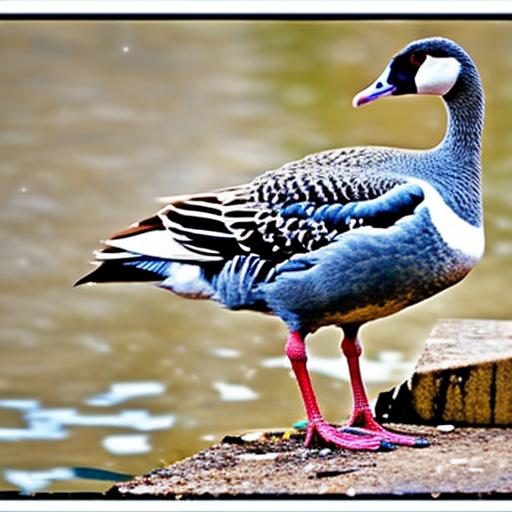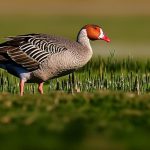Keeping geese in urban areas is a growing trend among city dwellers who are looking for a unique and rewarding pet. Geese are not only beautiful and fascinating creatures, but they also offer a range of benefits to their owners and the community. In this article, we will explore the benefits of keeping geese in the city, how to choose the right breed for urban settings, housing and shelter requirements, feeding and nutrition guidelines, health and veterinary care, managing noise and odor concerns, legal considerations, socializing and training techniques, and ultimately help you decide if keeping geese in the city is right for you.
The popularity of keeping geese in urban areas has been on the rise in recent years. People are increasingly drawn to the idea of having a unique and low-maintenance pet that can also provide practical benefits. Geese are known for their beauty, intelligence, and social nature, making them an interesting addition to any backyard or garden. Additionally, geese can serve as natural pest control agents, fertilize gardens with their droppings, and provide entertainment and companionship to their owners.
Key Takeaways
- Urban geese keeping can be a rewarding and sustainable hobby for city dwellers.
- Keeping geese in the city can provide benefits such as pest control, egg production, and fertilizer.
- Choosing a breed of geese that is adaptable to urban settings is important for their well-being.
- Providing adequate housing and shelter is crucial for the health and safety of urban geese.
- Proper feeding and nutrition, as well as regular veterinary care, are essential for the longevity of urban geese.
Benefits of keeping geese in the city
One of the main benefits of keeping geese in the city is their natural pest control abilities. Geese are excellent at keeping unwanted insects and pests at bay. They have a keen sense of sight and hearing, which allows them to detect potential threats to their territory. Geese will chase away pests such as rodents, snakes, and even larger animals like raccoons or foxes. This can be particularly beneficial for urban gardens or small farms where pests can cause significant damage to crops.
Another benefit of keeping geese in the city is their ability to provide natural fertilizer for gardens. Geese produce large amounts of droppings, which are rich in nutrients that can help improve soil quality. Their droppings contain high levels of nitrogen, phosphorus, and potassium, which are essential for plant growth. By allowing geese to roam freely in your garden or providing them with a designated area, you can benefit from their natural fertilization process and reduce the need for chemical fertilizers.
In addition to their practical benefits, geese can also provide entertainment and companionship. Geese are highly social animals and enjoy the company of humans and other animals. They are known for their playful nature and can provide hours of amusement with their antics. Geese are also loyal and form strong bonds with their owners, making them excellent companions. Whether you are looking for a pet that can keep you entertained or a friend to share your outdoor activities with, geese can be a great choice.
Choosing the right breed of geese for urban settings
When it comes to choosing the right breed of geese for urban settings, there are several factors to consider. Some breeds are better suited for city living than others, so it’s important to do your research and select a breed that will thrive in an urban environment.
Some popular breeds for urban areas include Toulouse geese, Embden geese, and Chinese geese. Toulouse geese are known for their calm and friendly temperament, making them a good choice for families with children or other pets. Embden geese are large and hardy birds that can adapt well to different climates. Chinese geese are smaller in size and have a distinctive appearance with their knobbed heads. They are known for being alert and vocal, which can be beneficial for alerting you to potential threats.
When choosing a breed, it’s important to consider the characteristics that are important to you. Some breeds may be more docile and easier to handle, while others may be more active and require more space to roam. Additionally, consider the climate in your area and choose a breed that is well-suited to the temperature and weather conditions.
Housing and shelter requirements for urban geese
Providing appropriate housing and shelter for your urban geese is essential for their health and well-being. There are several housing options to consider, depending on the space available and your specific needs.
One option is to provide a small coop or shed for your geese to sleep in at night. This will protect them from predators and provide a safe and secure space. The coop should be well-ventilated and have enough space for the geese to move around comfortably. It should also have a nesting area where the geese can lay their eggs.
If you have a larger backyard or garden, you may consider providing a fenced-in area for your geese to roam during the day. This will allow them to graze on grass and forage for insects, which is important for their diet. The fenced-in area should be secure and predator-proof, with a sturdy fence that is at least four feet high.
In addition to providing housing, it’s important to consider the space requirements for your geese. Geese need ample space to move around and exercise, so make sure they have enough room to stretch their wings and walk around comfortably. A general rule of thumb is to provide at least 20 square feet of space per goose.
Safety considerations are also important when it comes to housing and shelter for urban geese. Make sure the area is free from toxic plants or chemicals that could harm your geese. Additionally, secure any potential escape routes or openings in fences to prevent your geese from wandering off or getting into trouble.
Feeding and nutrition guidelines for city geese
Feeding your urban geese a balanced diet is crucial for their health and well-being. Geese are herbivores and primarily eat grass, but they also require additional nutrients to thrive.
The main component of a goose’s diet should be fresh grass or pasture. Geese are excellent grazers and enjoy eating a variety of grasses and plants. If you don’t have access to a large grassy area, you can provide your geese with fresh grass clippings or hay. Make sure the grass is free from pesticides or chemicals that could be harmful to your geese.
In addition to grass, geese also require supplemental nutrition to meet their dietary needs. You can provide them with commercial waterfowl feed, which is specifically formulated for geese and contains the necessary vitamins and minerals. It’s important to choose a high-quality feed that is free from additives or fillers.
When it comes to feeding your geese, it’s important to provide them with the right amount of food. Geese have a high metabolism and require a significant amount of food to maintain their energy levels. A general guideline is to provide about 1/3 to 1/2 pound of feed per goose per day. However, this can vary depending on the breed, age, and activity level of your geese.
In addition to grass and commercial feed, you can also supplement your geese’s diet with fresh fruits and vegetables. Geese enjoy eating a variety of fruits and vegetables, such as lettuce, spinach, peas, and berries. Just make sure to introduce new foods gradually and monitor your geese’s response to ensure they tolerate them well.
Health and veterinary care for urban geese

Keeping your urban geese healthy is essential for their overall well-being. Geese are generally hardy animals, but they can still be susceptible to certain health issues. It’s important to be proactive in preventing illness and providing appropriate veterinary care when needed.
Some common health issues that can affect geese include respiratory infections, parasites, and foot problems. Respiratory infections can be caused by poor ventilation or exposure to cold drafts. To prevent respiratory infections, make sure your geese have access to fresh air and a well-ventilated shelter. Regular cleaning of their living area can also help prevent the buildup of bacteria or mold that could contribute to respiratory issues.
Parasites, such as worms or mites, can also affect geese. Regular deworming and parasite prevention measures are important to keep your geese healthy. Consult with a veterinarian to determine the appropriate deworming schedule and products for your geese.
Foot problems, such as bumblefoot or foot infections, can occur if your geese are kept on hard or rough surfaces. Providing a soft bedding material, such as straw or wood shavings, can help prevent foot problems. Regularly inspect your geese’s feet for any signs of swelling, redness, or sores, and consult with a veterinarian if you notice any issues.
Finding a veterinarian who is experienced in treating geese can be challenging, as not all veterinarians have experience with these animals. It’s important to do your research and find a veterinarian who is knowledgeable about geese and can provide appropriate care. Local poultry or waterfowl clubs may be able to provide recommendations for veterinarians in your area.
Managing noise and odor concerns with urban geese
One concern that many people have when it comes to keeping geese in the city is the potential for noise and odor issues. Geese are known for their loud honking sounds, which can be disruptive to neighbors in close proximity. Additionally, their droppings can produce an unpleasant odor if not managed properly.
To reduce noise concerns, there are several strategies you can employ. One option is to choose breeds that are known for being quieter, such as Toulouse geese. Additionally, providing plenty of mental and physical stimulation for your geese can help reduce excessive honking. This can include providing toys or objects for them to interact with, as well as ensuring they have enough space to roam and exercise.
When it comes to managing odor concerns, proper waste management is key. Geese produce a significant amount of droppings, so it’s important to regularly clean their living area and remove any accumulated waste. Composting the droppings can also help reduce odor and provide a valuable source of fertilizer for your garden.
Being a considerate neighbor is also important when keeping geese in the city. Communicate with your neighbors about your plans to keep geese and address any concerns they may have. Taking steps to minimize noise and odor, such as providing appropriate housing and waste management, can go a long way in maintaining positive relationships with your neighbors.
Legal considerations for keeping geese in the city
Before getting geese in the city, it’s important to familiarize yourself with the local laws and regulations regarding poultry or livestock keeping. Some cities or neighborhoods may have specific restrictions or requirements when it comes to keeping geese.
Check with your local government or animal control agency to determine if there are any permit requirements or restrictions on keeping geese. Some areas may require a permit or license for keeping poultry or livestock, while others may have specific zoning regulations that dictate where and how geese can be kept.
It’s also important to be aware of potential fines or penalties for violating local laws or regulations. Failure to comply with permit requirements or zoning regulations could result in fines or other legal consequences. By understanding and following the local laws, you can ensure that you are keeping your geese in a legal and responsible manner.
Socializing and training urban geese
Socializing and training your urban geese is an important part of their care and can help build a strong bond between you and your birds. Geese are highly social animals and enjoy interacting with their owners and other animals.
Socialization should begin from a young age, ideally when the geese are still goslings. Spend time with your geese, handle them gently, and provide positive reinforcement for good behavior. This will help them become accustomed to human interaction and develop trust.
Basic training techniques can also be used to teach your geese basic commands or behaviors. Geese are intelligent animals and can learn to respond to verbal cues or hand signals. Start with simple commands, such as “come” or “stay,” and gradually increase the complexity of the tasks as your geese become more comfortable and responsive.
Building a bond with your geese is important for their overall well-being and can make the experience of keeping geese in the city more rewarding. Spend quality time with your geese, engage in activities together, and provide plenty of positive reinforcement. This will help strengthen the bond between you and your geese and create a positive and enriching environment for them.
Is keeping geese in the city right for you?
Keeping geese in the city can be a rewarding and fulfilling experience, but it also comes with its own set of challenges. Before deciding to get geese, it’s important to carefully consider the benefits and challenges of urban geese keeping.
The benefits of keeping geese in the city include natural pest control, fertilizer for gardens, and entertainment and companionship. Geese can help keep unwanted pests at bay, provide natural fertilizer for gardens, and offer hours of amusement with their playful nature. Additionally, geese are social animals that can form strong bonds with their owners, making them excellent companions.
However, there are also challenges to consider when it comes to keeping geese in the city. Noise and odor concerns can be an issue for neighbors, so it’s important to take steps to minimize these issues. Additionally, there may be legal considerations or permit requirements that need to be addressed before getting geese.
Before getting geese in the city, ask yourself some important questions. Do you have enough space to accommodate geese and provide them with appropriate housing and exercise? Are you prepared to invest the time and effort into their care, including feeding, cleaning, and veterinary care? Are you willing to address any potential noise or odor concerns and be a considerate neighbor?
If you have carefully considered these questions and are willing to take on the responsibilities of keeping geese in the city, then it may be the right choice for you. Geese can bring joy, entertainment, and practical benefits to your life, as well as contribute to a more sustainable and eco-friendly urban environment.
For further information on keeping geese in the city, there are several resources available. Local poultry or waterfowl clubs can provide valuable advice and support. Online forums or social media groups dedicated to geese keeping can also be a great source of information and community. Additionally, books or online resources on geese care can provide in-depth guidance on all aspects of urban geese keeping.
If you’re interested in keeping geese in the city, you might also want to check out this informative article on poultrywizard.com about chicken coops in Chester, SC. It provides valuable insights into creating a suitable living space for chickens, which can be adapted for geese as well. Additionally, if you’re looking for a space-saving option, the article on A-frame chicken coops is worth exploring. And if you’re considering breeding quail alongside your geese, you’ll find useful information on whether quails sit on their eggs in this article. Happy reading!
FAQs
What are the benefits of keeping geese in the city?
Geese can provide a source of fresh eggs and meat, as well as natural pest control for gardens and lawns. They can also be entertaining pets and can help teach children about animal care and responsibility.
What are the challenges of keeping geese in the city?
City ordinances may limit the number of geese that can be kept, and neighbors may object to noise and odors. Geese require adequate space and access to water, which can be difficult to provide in an urban environment.
What do geese need to thrive in a city environment?
Geese need access to clean water for drinking and bathing, a secure and spacious enclosure, and a balanced diet that includes grains, greens, and protein. They also need protection from predators and extreme weather conditions.
What are some common breeds of geese that are suitable for city living?
Toulouse, Embden, and Pilgrim geese are popular breeds for urban environments due to their calm temperament and adaptability to confinement. They also tend to be good egg layers and meat producers.
What should I consider before keeping geese in the city?
Before keeping geese in the city, it is important to research local ordinances and obtain any necessary permits. You should also consider the amount of space and resources you have available, as well as the potential impact on neighbors and the environment. It is also important to have a plan for the long-term care and well-being of the geese.
Meet Walter, the feathered-friend fanatic of Florida! Nestled in the sunshine state, Walter struts through life with his feathered companions, clucking his way to happiness. With a coop that’s fancier than a five-star hotel, he’s the Don Juan of the chicken world. When he’s not teaching his hens to do the cha-cha, you’ll find him in a heated debate with his prized rooster, Sir Clucks-a-Lot. Walter’s poultry passion is no yolk; he’s the sunny-side-up guy you never knew you needed in your flock of friends!







